New Delhi: Tucked away in a South West Delhi neighbourhood, two tin sheds sit side by side in stark contrast.
One, an Animal Birth Control (ABC) centre, stinks of blood, urine and rotting food. Flies hover over its sticky floors, and three stray dogs lie listlessly under a rickety table near the entrance. On its right, the pet boarding facility is cool, clean, dotted with potted plants and inhabited by a single, well-fed dog. A visibly drunk caretaker tries to heckle the dog, and is bitten as a result. In response, he picks up a stick, and beats the creature brutally.
These are the facilities of the Pet Animal Welfare Society (PAWS) in Masoodpur, near Vasant Kunj, run by Dr R. T. Sharma.
Last month, Delhi Chief Minister Rekha Gupta called for the relocation of stray dogs in the city as part of a cleanliness drive. However, animal rights activists and the rescuer community say this amounts to cruelty and goes against established laws and rules. Sterilisation on a war footing, they say, is the most effective and humane way to bring down the city’s stray dog population but the city’s ABC centres are far from equipped to make it happen.
In Delhi, the ABC programme has been operational for the past two decades under the jurisdiction of the Municipal Corporation of Delhi (MCD), with 20 centres currently operational. The full funding for the programme is given by the state government to local bodies, who then disburse it to the ABC centres.
ThePrint conducted a ground assessment of six centres—Friendicoes-SECA, V.H. Ghazipur, Sonadi Charitable Trust in Najafgarh, Animal India Trust in Lajpat Nagar, PAWS in Masoodpur, and Dr. Sanjay Kumar’s and Dr. Rajeev Kumar’s centres in Usmanpur and Rohini, respectively. This reporter was not allowed into the premises of the Animal India Trust centre. At the other centres, the conditions were alarmingly poor, with a blatant disregard for established rules and procedures.
ThePrint reached the management of these centres for comment for comment. Speaking to ThePrint, Dr R. T. Sharma, president, PAWS, said, “Criticism is easy but it takes guts to appreciate. We have four vets in our hospital and we have been doing the ABC programme for the last 25 years, running it very successfully with our volunteers and animal lovers. Ours is an open shelter and we keep only sick patients that are under treatment. We discourage healthy animals in the shelter as captivity is cruelty in our policy. The photographs taken from outside were of a 15-year-old abandoned vehicle of ours.”
An emailed response from Amanda Seth, president, and Geeta Seshamani, vice-president of Friendicoes, stated: “Championing the cause of sterilisation and vaccination for street dogs, ruthlessly being killed by gassing, poisoning and electrocution in the past, Friendicoes has since 1993 not swerved from its position that sterilisation is the only humane and scientific way to control the street dog population, the community pets that an army of dog feeders throughout the country care for with loving respect.”
It further said: “To say Friendicoes ignores established rules and procedures is false. Our centres have CCTV, all records required are maintained including vehicle books for the pickup of dogs and their release. We faithfully use the app provided by the authorities and all records are available for checking and sent to the MCD each month. Photos are taken of dogs and their locations to support the documentation. Each dog is tagged and GPS-located on the app. Ask the public and you will be told Friendicoes is to be trusted in matters of ensuring dogs return to their areas faithfully.”
The need of the hour, the statement further said, was for vets, authorities and NGOs to collectively discuss how to remedy the challenges faced by some of the ABC units, and what can be done to elevate the programme and find solutions.
This report will be updated if and when responses from the other organisations are received.
Also Read: As animal rescuers slam Delhi CM’s stray dog relocation directive, a look at issue from a legal lens
What the rules say
To run a sterilisation centre in India, one needs to follow a structured and legally mandated process under the Animal Birth Control Rules 2023—a set of guidelines for the management of the stray dog population through vaccination and sterilisation.
First and foremost is to obtain a project recognition from the Animal Welfare Board of India (AWBI). This recognition is not optional, it is essential under Rule 5. Whether it’s a local municipal authority or a registered animal welfare organisation, no one can carry out sterilisation or vaccination of stray dogs without this approval. A dedicated project recognition committee formed by the AWBI reviews each proposal before granting recognition.
Once it obtains the go-ahead, the organisation must develop proper infrastructure for the ABC centre. This includes surgical areas, post-operative recovery rooms, and kennels for dogs to rest before and after the procedure. A quarantine area is also necessary to isolate sick or aggressive dogs. Equally important is assembling a trained team: qualified veterinarians, para-veterinary staff, dog catchers, and support personnel. Everyone involved in the actual sterilisation and care must undergo training from institutions approved by the AWBI to ensure humane practices and medical competence.
ABC Centres do not work in isolation. They are meant to function in close coordination with local bodies like municipal corporations or gram panchayats. These local authorities are responsible for identifying areas with a high stray dog population, coordinating dog capture, and monitoring the effectiveness of the programme on the ground. Once the programme is underway, the process unfolds with the humane capture of stray dogs. They are brought safely to the centre, examined for fitness, and then sterilised under sterile surgical conditions. While under care, they also receive vaccinations, primarily against rabies.
After surgery, each dog is required to receive proper post-operative care, including food, antibiotics, and rest. Once the veterinarians certify that a dog has healed, it is released back to the exact location it was picked up. The rationale is that every dog has a defined territory, and disrupting this could lead to territorial fights and possibly human-animal conflict.
The work doesn’t end with surgery and release. Centres must keep detailed records—dog identification, medical history, surgery reports, release data, and even count the reproductive organs removed during the sterilisation surgeries that took place through the day. These reports must be submitted periodically to the AWBI and local bodies. At the same time, building community awareness around the ABC process is vital.
“When people understand the goals and the humane methods used, the programme faces less resistance and gains more volunteers and local support,” animal rights activist Vipul Jain, founder of PAWS (People for Animal Wellness and Sustainability) Foundation, told ThePrint. Established in 2023, PAWS Foundation has been spearheading animal welfare efforts inside the Jawaharlal Nehru University (JNU) campus.
The guiding principles behind the ABC Rules, 2023, are rooted in animal welfare and public health. No dog should be subjected to cruelty, pain, or unnecessary confinement. The larger aim is to manage the stray dog population humanely and scientifically, while also preventing diseases like rabies.
“If done right, these centres can play a transformative role—not just in controlling street dog numbers but in fostering a more compassionate relationship between animals and the people who live among them,” Jain added.
No vet, unsanitary conditions
However, the reality at least five of these centres was very different. ThePrint found that at all six centres, not a single veterinarian or paravet was present between the hours of 11 am to 6 pm. The premises were unsanitary, infested with flies, and reeked of animal waste. This reporter was not allowed to take photographs of the enclosures where the dogs were kept.
Friendicoes denied ThePrint’s findings.
For instance, at the Najafgarh centre run by Sonadi Charitable Trust—the largest ABC facility in Delhi—only one paravet was present, with no vet in sight, despite more than 6–7 unattended dogs in the reception area. One caretaker, who declined to be named, claimed they received around 11–12 dogs daily. There were three caretakers at the centre in total, including one paravet.
Several dogs were crammed together in a tin shed enclosure outside the clinic, exposed to the scorching heat. These dogs had no identification tags mandated under sub-sections 3 and 8 of ABC Rules Section 11. It clearly states that all stray dogs caught for sterilisation are to be identified with a numbered collar immediately upon arrival at a centre.
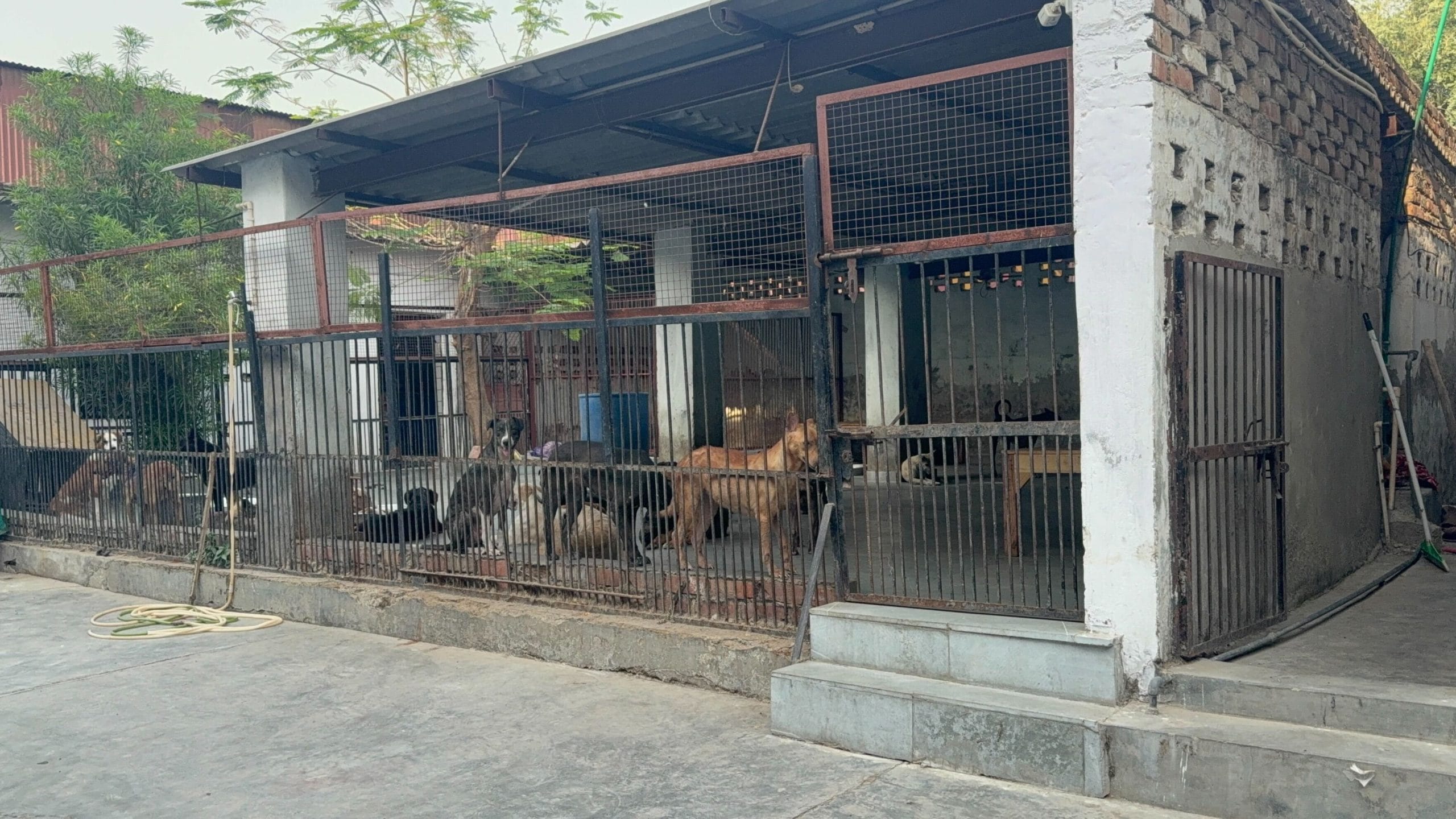
When asked about the dogs, a caretaker casually said, “These are the dogs who never went back.” He also said that the team does not actively catch stray dogs but responds only to complaints.
The centre had two vans and one of the workers was seen checking a wire noose, which he claimed was “effective” in catching the dogs. However, such tools often lead to injuries and strangulation. Notably, a 2011 meeting of the MCD’s ABC monitoring committee had recommended humane alternatives like butterfly nets. This remains unimplemented.
Dogs were exposed to the natural elements at the PAWS centre near Vasant Kunj since a middle section of the tin-roof shed was open. According to the caretaker, only four of the dogs currently housed there came through the MCD. The rest—around 10 to 15 dogs—were brought in through their NGO. In such cases, residents pay Rs 2,500 to have stray dogs from their neighbourhood sterilised.
In contrast, the pet boarding section had cooling sheets, proper sanitation, and designated spaces for washing and bathing pets.
The Rohini ABC centre operates out of a three-storey building, though only the ground floor is in use. When ThePrint visited the centre, it was locked from the inside. The staff only opened the doors to the premises after persistent knocking.
It did not look like the facility was being used for either sterilisation or vaccination. Of the five rooms on the ground floor, two looked like they were being used as living quarters for the staff. One of the rooms was empty with a few clean medical supplies and what looked like unused doctor’s uniforms, and two had surgery tables, but no signs of regular surgical activity despite the caretakers’ claim that at least one sterilisation surgery takes place every day. The centre had three vans, and their rusty appearance appeared to be an indication that they were not being used.
At first, the four staff members claimed that one of them was a dog catcher and two were paravets. However, none of them could answer questions about surgeries or the ABC programme. Eventually, they said they were just caretakers.
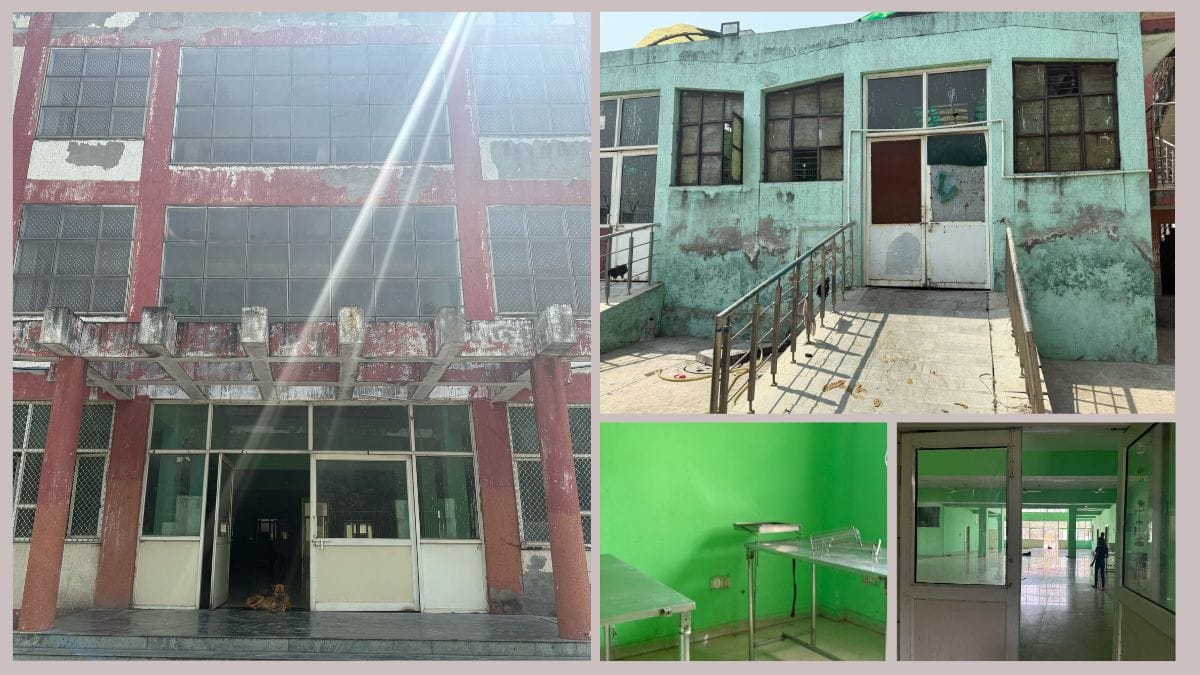
Behind the main building, stray dogs were being kept in another comparatively smaller building. Inside, flies swarmed the enclosures, while blood and urine could be seen on the floors and their stench permeated the air. More than three dogs were crammed into enclosures, without any markings or records of their pickup locations. However, the facility was barely half full.
In October 2023, the Rohini centre was among those that were temporarily restrained by the MCD from performing sterilisation work on the directions of the Delhi High Court. The court reiterated that no society, trust, or cooperative society could carry out the ABC programme without project recognition certificates.
It was not clear if the centre has still obtained a certificate.
At the Friendicoes facility in Ghazipur that ThePrint visited, the conditions were unsanitary for both the animals and the workers. Again, the room where the dogs were being kept reeked of urine and body waste, making it almost impossible to stay inside for more than a few seconds. Puddles of urine pooled across the floor, leaking into the adjacent room where discarded bandages, plastic wrappers, and old newspapers crusted with dirt, among other trash, covered the floor. Flies had settled on every surface. Caretakers claimed the centre housed over 100 dogs, despite lacking the infrastructure to accommodate that number.
In response, the organisation said in its statement: “Friendicoes has no qualms in pulling up any staff compromising the hygiene of its premises but its important to remember this centre runs near the dairy farms of Gazipur, has the Gazipur nalah behind it and a derelict hospital slated for demolishment next to it, and given the season, flies are a problem.”
It further went on to say it was sheer determination to help with the increasing population of East Delhi dogs that has kept Friendicoes there. “The authorities are well aware of the back flow of drain water during monsoons, the fact that at its own cost Friendicoes has set up the surgery for all surgical procedures in a specially equipped 40ft x 8ft container on higher ground, done extensive repairs inside the ABC unit, raised floor levels, put roofing in, all at our own cost.”
2023 report on ABC centres
According to a report submitted to the Delhi High Court in Anubhav Khajuria and others vs Union of India through Ministry of Fisheries, Animal Husbandry and Dairying (2023) by animal welfare activist Gauri Maulekhi and advocate Shalini Aggarwal, between January to April 2023, 4 out of 20 centres in Delhi were non-functional. Of the operational ones, four were not run by animal welfare organisations but by private veterinarians with “motive of profit”, the report said.
“The disregard for the welfare of animals and failure to adhere to minimum standards under the 2023 Rules (previously 2001 Rules) and Revised Module to cut corners and find higher profit margins is evident,” said the ‘Report on the Implementation of Animal Birth Control Program in Delhi.’
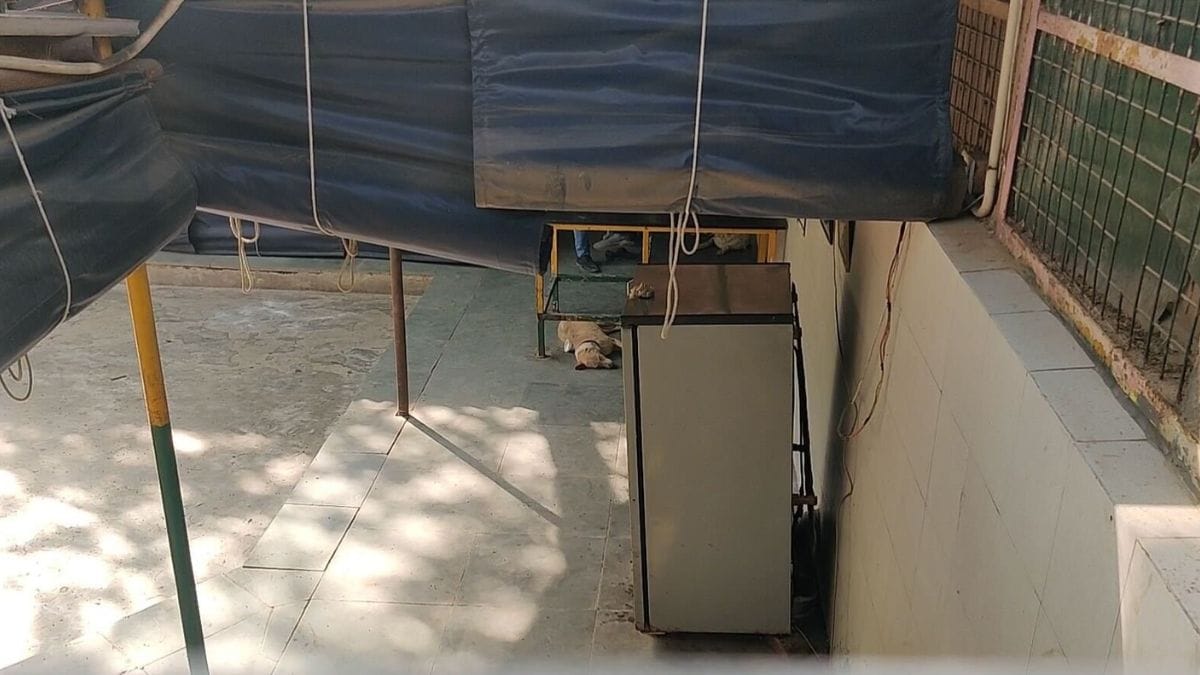
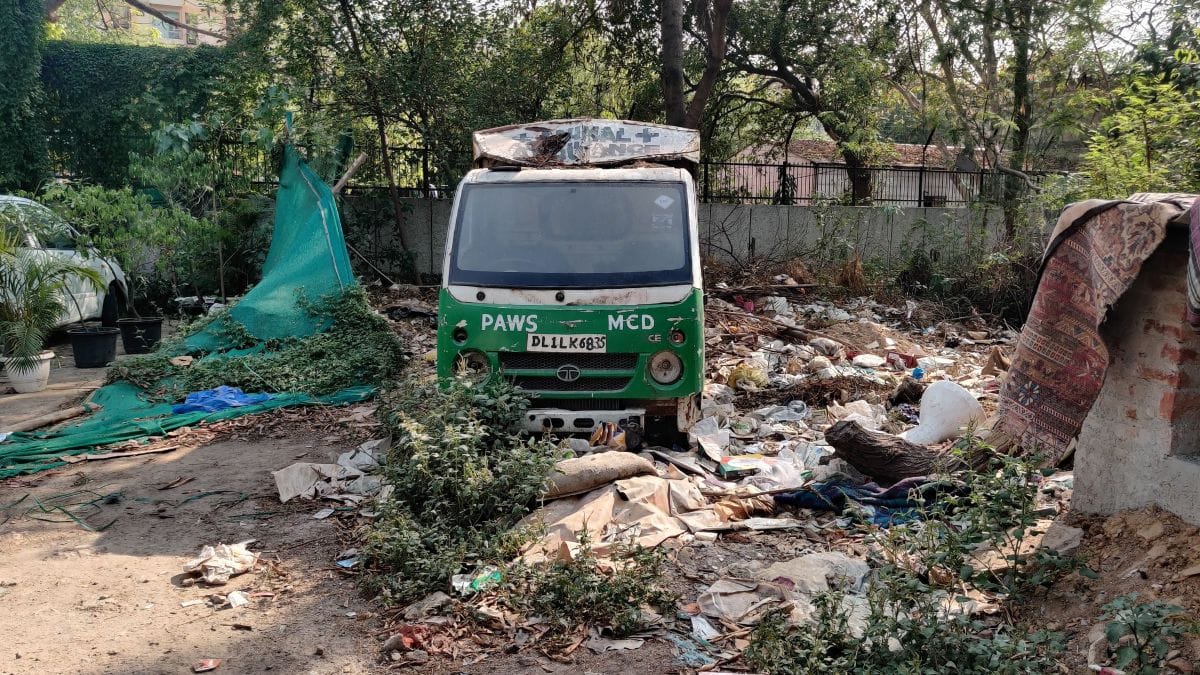
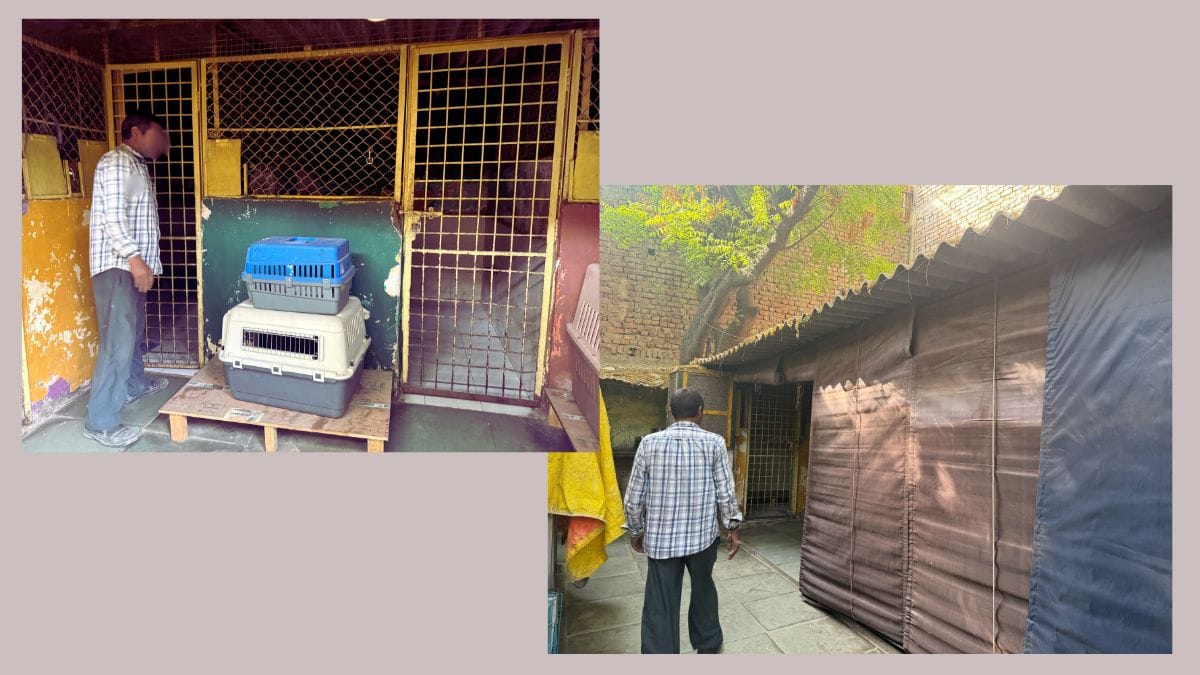
The Rohini centre, according to the report, claimed to have sterilised over 3,700 dogs between April 2022 and January 2023. However, records showed that it procured only 1,000 doses of vaccines in 2022, and none thereafter until January 2023. This suggests that less than a third of the dogs listed in the organ counting certificates were actually vaccinated by the centre. This would be a clear violation of ABC Rules, which mandate the release of sterilised dogs within three days post-surgery, or five days in the case of complications.
In several instances, when stray dogs were picked up by MCD teams, the ABC centre was not provided with accurate pickup locations, making a timely and lawful release of the dogs difficult.
The report also flagged improper waste disposal across most centres. It found that solid and biomedical waste were often stored in uncovered bins within the premises. There was also no visible implementation of segregation, storage, or disposal under the Solid Waste Management Rules, 2016, and the Bio-Medical Waste Management Rules, 2016.
The Friendicoes statement refuted Maulekhi’s report on the issue of biomedical waste management as far as its ABC centre goes. “Friendicoes has been registered under the Bio Medical Waste Management Rules 2016 under the Delhi State Pollution Committee since 2020. And waste is segregated as per the rules and collected by the authorities.”
Maulekhi’s further said that none of the ABC centres maintained logbooks for their dog-catching vans. This lack of documentation made it impossible to track the distance covered or areas visited by the vans daily.
In June 2022, Friendicoes, according to the report, recorded the sterilisation of 721 dogs. However, according to the report submitted to the Delhi HC, sterilising that many dogs in a month would require space for at least 150 dogs at any given time, while the facility only had space for 84 dogs at one time.
However, Friendicoes said the mathematics of this can be challenged, “as ABC dogs stay with us 4 days, and rarely upon complications longer”.
“That averages approximately 23 dogs a day who require to stay 4 days approximating 92 dogs at any time in the kennels. What the report seems to have failed to take into account is the number of individual cages which the centre had space for at that time, and had been placed at the ABC centre to help make housing more comfortable for the street dogs.”
‘Complete sham’
Dr Suresh Kumar Yadav, the deputy director (veterinary services) at the MCD, did not respond to ThePrint’s request for comment, while Navin Choudhary, additional chief secretary in the Department of Urban Development and Director of Local Bodies (DLB), said that at a state ABC monitoring committee meeting in March, “there were a lot of defaulters who did not have project recognition. They were given a warning. Very few had the certificate.”
But he declined to give details.
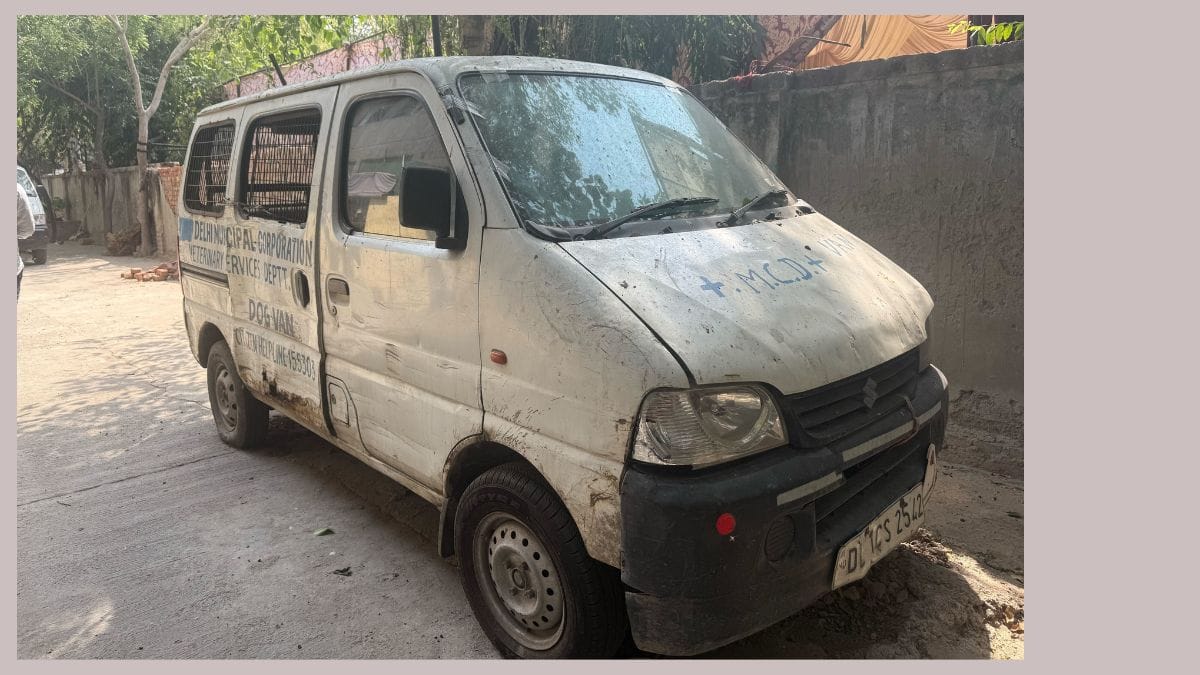
According to a dog census conducted by the MCD in 2012, there were an estimated 2 lakh stray dogs in the national capital. No fresh census has been carried out since.
Animal rights activists estimate that the current stray dog population in Delhi is significantly higher—closer to 7.5 lakh, highlighting the urgent need for updated figures and better implementation of population management programmes.
Meanwhile, according to the report submitted to the Delhi HC, the MCD claimed to have sterilised over 5 lakh dogs between 2016 and December 2022.
“While the ABC programme remains the only legally sanctioned method for managing dog populations, its implementation in Delhi has been a complete sham for years,” Maulekhi, who is also the trustee of People for Animals, India’s largest animal welfare organisation, told ThePrint.
She pointed out that the infrastructure in most ABC centres does not meet the required standards. “There are hardly any records being maintained as per the rules”, and inspection teams responsible for organ counting, mandated under the ABC rules, are also not functioning as they should.
Maulekhi added that surveillance systems, such as CCTV cameras, are supposed to be installed not only in operating theatres but also in kennel areas, yet they are missing in most places. “There is no training for veterinarians, paravets, or dog catchers,” she said, describing the programme as unorganised and poorly managed.
She explained that if the ABC programme were implemented properly, Delhi’s stray dog population would not be as high as it is today. According to her, many centres are not conducting sterilisation surgeries at all. “Most of them are just billing for surgeries. They are not actually doing them,” she said.
She also raised concerns about the role of officials in the MCD. “Some MCD officials are extremely corrupt. We’ve raised complaints, but nothing has come of them,” she said.
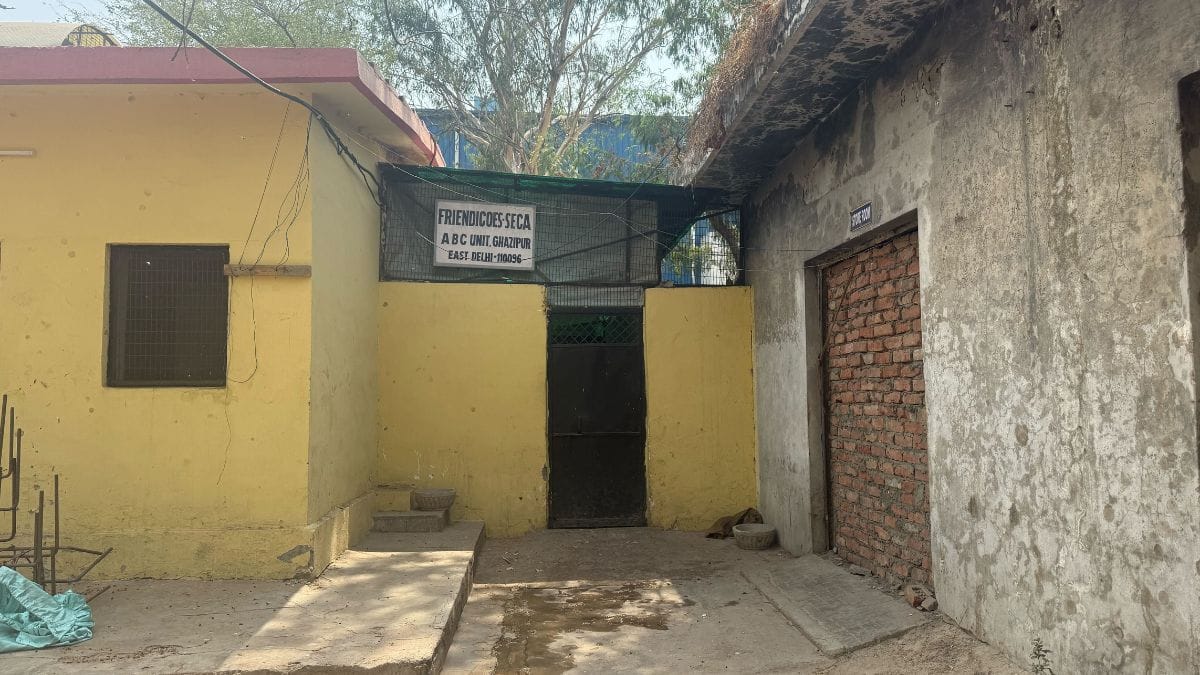
In her view, the process involves private contractors getting tenders, raising false bills for surgeries that never happened, and receiving payments from MCD officials in return for kickbacks. “That is the state of the ABC programme in Delhi.”
Former MP Vijay Goel argued that the current rules are impractical and force Resident Welfare Associations (RWAs) and NGOs to bear responsibilities they didn’t sign up for. Goel is leading a public campaign against the ‘stray dog problem’. According to the website, the movement is trying to raise awareness against stray dog bites and to ensure an “amicable human-dog relationship”.
“Dogs should not be allowed to live in residential societies where people are unwilling to let them in,” Goel said, asking why residents should accept their presence if they feel unsafe. He claimed that most ABC centres—run by these NGOs—are ineffective. “NGOs are doing nothing. Why is MCD outsourcing to them?”
Goel also criticised the AWBI, alleging that a handful of members control the registration process and limit the number of NGOs allowed to operate in Delhi. “It’s wrong to centralise everything. Local bodies should be allowed to do their work without interference from AWBI.”
According to MCD, between January 2018 and February 2023, 1,27,036 dog bite cases were recorded. However, it was not clear how many of these cases were stray dogs.
Challenges faced by NGOs running the ABC centres
For the organisations operating the ABC centres, there are challenges aplenty. For example, Friendicoes summed them to be “financial and infrastructural”.
“We continue to work against all odds because the street dogs need us. Delhi’s rates for ABC are amongst the lowest in the country, but Friendicoes has, with its limited budget, tried to make the centre as close to a good centre as possible.”
All this, the Friendicoes further said in its response, makes matters doubly hard. “At least at our centre, when electricity, water, all repairs and maintenance work, welding of iron grills and doors, replacing glass vandalised by people, replacing tiles, and so on is already the burden the NGO must bear when they operate an ABC unit here and on very poor reimbursement terms.”
When the ABC Rules were being amended, Friendicoes sent in suggestions to the AWBI when feedback was sought on the draft, but those “weren’t heeded”.
“We still feel the need for both amendments and clarifications,” Seth and Seshamani said in their statement.
Highlighting the challenges of running a sterilisation centre, Dr Vijay Kumar, a veterinarian and trustee of the Najafgarh ABC Centre said, “Some dogs take as long as three months to recover. Even after that, people often don’t accept them back in their original areas.”
“There are also people who eventually abandon their dogs at the shelter—they leave at night and disappear. We don’t know who they are,” he added, referring to the dogs crammed together in a tin shed enclosure outside the clinic.
“We normally use a butterfly net, but for dogs that are more aggressive, we use a wired noose.” he further said.
He also claimed that while he had been running the centre since 2001, he hadn’t received “a single rupee from the government to operate it, except for a small amount for infrastructure from the Animal Welfare Board of India (AWBI)”.
“I even wrote to the AWBI, but no action was taken,” added Dr Kumar.
“The space is limited, and we have to spend a lot of money. Usually, when you catch a dog, you have to do an X-Ray. You need to keep a doctor and a paramedic on staff, and you must follow the ABC protocol. We receive Rs 1,000 for one operation, but following the full protocol costs around Rs 1,500.”
Case studies in UP, Uttarakhand
According to Maulekhi, Uttarakhand and Lucknow could serve as model examples for other states in implementing the ABC programme. She said the initiative in Uttarakhand, which was virtually non-existent before 2014, began with careful planning. The government realised it couldn’t roll out the programme across the entire state at once, so it adopted a phased approach.
They first targeted three major tourist destinations—Nainital, Mussoorie, and Dehradun. From there, the programme expanded to nearby local authorities and eventually to larger municipal areas in the plains. Maulekhi explained that the creation of well-equipped ABC centres, particularly, is what made this approach effective.
These centres were not just makeshift sheds seen in Delhi, but scientifically designed hospitals with proper operation theatres, post-operative care units, quarantine and isolation facilities, residential quarters for staff, kitchens for feeding dogs, and dedicated areas for medicine storage and record-keeping.
She pointed out that the Dehradun centre, being the first of its kind, became a model facility that was later replicated by other states. “People from different states came and copied that programme,” she said.
Lucknow, she added, is another success story. It now has India’s largest ABC centre, which is also on its way to becoming a national training hub for the programme.
Maulekhi emphasised that such success was only possible because the state government took ownership and monitored the programme closely. In Uttarakhand, a state-level ABC monitoring committee meets every three months, chaired by the state’s urban development secretary, to review progress.
Monthly progress reports are submitted from each ABC centre—not only to the government but to all committee members, including Maulekhi herself.
She remarked that this process helps catch issues early before they fester or corruption sets in. “That’s what’s gone wrong in Delhi,” she said, pointing to how the absence of strong oversight has led to serious lapses in the capital’s ABC programme.
This report has been updated to incorporate a response from Friendicoes, PAWS president Dr R. T. Sharma, and Dr Vijay Kumar, trustee of the Najafgarh ABC Centre, as well as to clarify that this reporter was not permitted to enter the premises of the Animal India Trust at Lajpat Nagar.
(Edited by Sanya Mathur)
Also Read: Kedarnath pilgrimage is injuring mules—8,000 overworked animals, 1 medical shelter



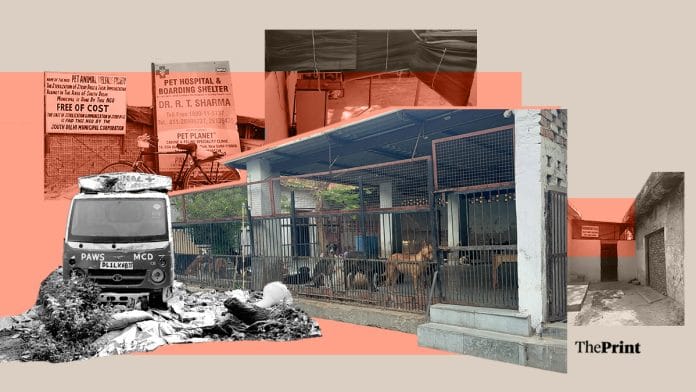



Thank you for exposing the crimes happening in Delhi in the name of Animal Welfare!
Thank you, Mrinalini and Team Print.
Like Writa has mentioned I too totally think that Canine Control and Care has the best ABC program in the world! Their centers are so meticulously clean and dogs are so relaxed and happy.
Will you please cover their work in Pune as it will be an eye opener for other cities that a successful ABC program can effectively bring down the stray dog population – there is no reason to kill them as killing for a hundred years did not even help the British to destroy India’s dogs! Sterilisation is the perfect solution but it has to be executed effectively – without corruption and tender business. Only CSR funded NGOs like CCC should be allowed to work in the ABC space. Pune has such an amazing success in controlling stay dog population thanks to CCC.
Please write to admin@caninecontrolandcare.org to get permission to visit their centers and understand why they are so successful in animal birth control program execution.
It’s disgusting how Delhi community dogs are being treated. The only sensible way to control stray populations is through the AWBI approved ABC process of sterilization and return of dogs to their original locations. This is what CANINE CONTROL AND CARE has been doing in Pune successfully. It is the most humane way.
It’s a shame to see ABC CENTRES in such rotten conditions…imagine how many dogs die because of the surgery itself or bec of the unhygienic filthy conditions of post operative care if there is any.
These poor dogs go through so much and the amount of money that corrupt people are making in the name of ABC whilst these dogs are dying.
I couldn’t agree more that a well run ABC can really transform animal welfare helping to curb human animal conflict and most importantly to end the suffering of these dogs and puppies.
I really wish DELHI’s ABC Centres can turn around their game and set an example for other cities to follow.
This can all happen if the people in authority just tighten their belts and AWBI also does more than just passing regulations and be stringent in their policies.
WE NEED EVERYONE TO COME TOGETHER AND WORK THIS OUT.
Stray dogs have no place at all in a city. They pose a grave danger to human beings.
One often comes across news of strays attacking and mauling little children and elderly people. At times, packs of stray dogs even kill toddlers and senior citizens.
The municipal authorities must initiate culling of stray dogs on an massive scale. This is of utmost importance to keep our streets and localities safe for children and elderly.